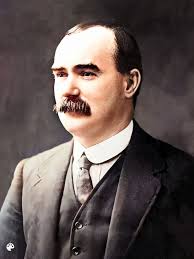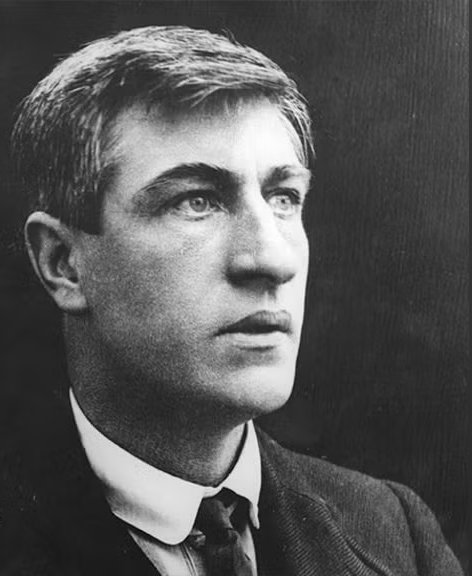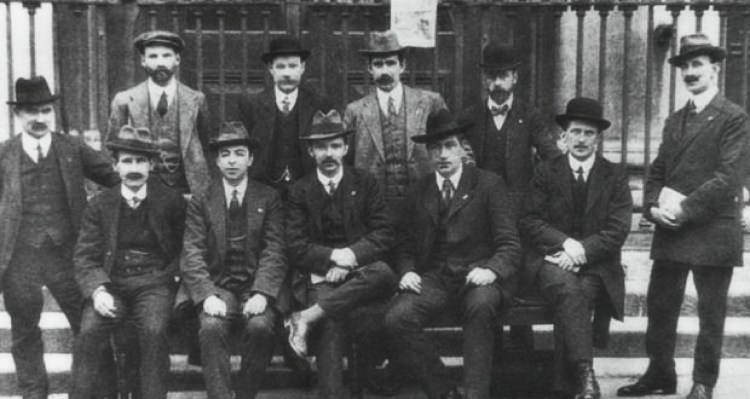Photo AI
Last Updated Sep 26, 2025
Connolly and Larkin & Their Contributions Simplified Revision Notes for Leaving Cert History
Revision notes with simplified explanations to understand Connolly and Larkin & Their Contributions quickly and effectively.
395+ students studying
Connolly and Larkin & Their Contributions
While looking into some key context surrounding 1913 and the various workers' strikes during this time, it is important to focus on some key figures who spearheaded key movements. Not least because they may well appear in some way as part of the 40-mark question. Even if they don't, it won't hurt to know Connolly and Larkin as background context. Remember, in your 40-mark question, there are only 16 OE marks, so whatever you can do to wow your examiner will be paramount.
James Connolly
-
James Connolly was a prominent socialist and trade union leader in Ireland, dedicated to improving workers' rights and advocating for socialism in the early 20th century.
-
In 1896, Connolly co-founded the Irish Socialist Republican Party (ISRP) (see below), which aimed to combine the fight for Irish independence with the struggle for workers' rights, emphasising the need for social and economic reforms.

-
Between 1903 and 1910, Connolly lived in the United States, where he was active in the Socialist Labor Party and the Industrial Workers of the World (IWW).
-
This experience broadened his understanding of labour struggles and union organising. Upon his return to Ireland in 1910, Connolly became an organiser for the Irish Transport and General Workers' Union (ITGWU), founded by James Larkin. The ITGWU aimed to unite all Irish workers, regardless of skill or trade, into one powerful union.
-
Connolly played a key role in the 1913 Dublin Lockout, a major industrial dispute between workers and employers.
-
He helped organise the workers' resistance and provided strategic leadership during the conflict.
-
In response to the police brutality during the Dublin Lockout, Connolly co-founded the Irish Citizen Army (ICA) in 1913. The ICA was a workers' militia established to protect striking workers and defend their rights.
-
Connolly was an influential writer and editor and used his skills to advocate for workers' rights. He edited several socialist newspapers, including The Workers' Republic, where he articulated his vision for a socialist Ireland.
-
Connolly was also a vocal advocate for women's rights, emphasising that the liberation of women was essential for the broader struggle for socialism and workers' rights.
-
Connolly's commitment to Irish independence and workers' rights led him to play a significant role in the Easter Rising of 1916.
-
As the leader of the ICA, he was a key figure in the planning and executing the rebellion against British rule. James Connolly's execution following the Easter Rising cemented his status as a martyr for both the labour and nationalist movements in Ireland.
James Larkin
-
James Larkin was a key figure in the labour movement in Ireland, particularly known for his contributions to trade unions and workers' rights during the 1910s.
-
In 1908, he founded the Irish Transport and General Workers' Union (ITGWU), aiming to create a union that included all skilled and unskilled workers under one organisation.
-
Larkin's leadership was instrumental during the 1913 Dublin Lockout, during which he organised strikes and rallies to demand better working conditions and pay for Dublin's workers.

-
His charismatic oratory and ability to mobilise large crowds made him a formidable leader during this significant labour conflict.
-
The lockout saw around 20,000 workers stand against approximately 300 employers for over seven months, making it one of Irish history's most intense labour disputes.
-
Larkin also played a crucial role in establishing the Irish Labour Party in 1912.
-
The party aimed to represent the political interests of the working class and was committed to advocating for social and economic reforms in Ireland.
-
He was known for his innovative approaches to labour organisation, including sympathetic strikes, where workers from different industries would strike to support each other, and the "One Big Union" concept that sought to unite all workers.
-
Larkin's work extended beyond Ireland. In 1914, he travelled to the United States to garner support for the Irish labour movement. He became involved in the American labour movement, joining the Industrial Workers of the World (IWW) and the Socialist Party of America.
-
During his time in the U.S., Larkin was arrested and imprisoned for his socialist activities, increasing his notoriety and status as a champion of workers' rights.
-
He returned to Ireland in 1923 and continued his involvement in labour organising and political activities, including serving as a Teachta Dála (TD) for Dublin North in the Irish parliament.
-
Larkin was a passionate advocate for the rights of unskilled workers, believing they deserved the same protections and benefits as skilled labourers.
-
His legacy includes promoting workers' rights and developing a strong labour movement in Ireland that continued to influence Irish politics and society long after his death in 1947.
The Irish Republican Socialist Party
- The Irish Socialist Republican Party (ISRP) was founded in 1896 by James Connolly, a prominent socialist and trade union leader.
- The ISRP represented a significant development in Irish politics. It was one of the first parties to explicitly combine the struggle for Irish independence with the fight for socialism.
- Connolly's vision was to address not only the national question of ending British rule in Ireland but also the social and economic issues facing the working class.
The ISRP was important for several reasons:
- Integration of Socialism and Nationalism The ISRP was groundbreaking in its attempt to merge Irish nationalism with socialism. Connolly believed that true independence could not be achieved without social and economic justice for all Irish people, particularly the working class.
- Advocacy for Workers' Rights The party was crucial in advocating for workers' rights and better working conditions. It sought to raise awareness about worker exploitation and the need for systemic change.
- Political Education and Mobilisation The ISRP was instrumental in politically educating the Irish working class. Through its publications, speeches, and meetings, the party helped to spread socialist ideas and mobilise workers to fight for their rights.
- Influence on Later Movements The ISRP laid the groundwork for future labour and socialist movements in Ireland. Its ideas and principles influenced the formation of later organisations, such as the Irish Labour Party and the Irish Transport and General Workers' Union (ITGWU).
- Role in the Easter Rising
Although the ISRP was not directly involved in the Easter Rising of 1916, its founder, James Connolly, was a key leader in the uprising. Connolly's participation underscored the connection between the struggle for national independence and the fight for social justice.

A Quick Look at the ITGWU Then and Now
- The ITGWU was established by James Larkin, aiming to unite all Irish workers into one powerful union, regardless of their trade or skill level.
- The union welcomed both skilled and unskilled workers, which was innovative at the time and helped it grow rapidly in membership and influence.
- Under Larkin's dynamic leadership, the ITGWU became a prominent force in the Irish labour movement, advocating for workers' rights and better conditions.
- The ITGWU played a central role in this major industrial dispute, where around 20,000 workers went on strike against about 300 employers. The lockout lasted over seven months, highlighting the union's commitment to fighting for workers' rights.
- The ITGWU was known for organising solidarity strikes, where workers from different industries would strike in support of one another, demonstrating unity and collective strength.
- By the 1920s, the ITGWU had become one of the largest and most influential unions in Ireland, significantly impacting labour relations and policies.
- The ITGWU had close ties with the Irish Labour Party, which James Larkin helped to establish in 1912, advocating for labour-friendly legislation and policies.
- The ITGWU continued to grow and adapt in the post-war period, addressing new challenges and opportunities in a changing economic landscape.
- In 1990, the ITGWU merged with the Federated Workers' Union of Ireland (FWUI) to form SIPTU (Services, Industrial, Professional and Technical Union), which remains Ireland's largest trade union today.
- The ITGWU's legacy lives on in its contributions to improving labour rights, working conditions, and the overall labour movement in Ireland, setting the foundation for future unions and labour activism.
Formation of the ITGWU
- The Irish Transport and General Workers' Union (ITGWU) was founded in 1909 by James Larkin, a prominent labour leader and socialist. Larkin recognised the need for a unified labour organisation that could represent the interests of both skilled and unskilled workers across various industries in Ireland.
- At the time, existing unions were often fragmented and limited to specific trades, leaving many workers without adequate representation.
- Larkin's vision was to create a powerful union to advocate for better wages, working conditions, and overall rights for all workers.
- The ITGWU was unique in its inclusivity, welcoming members from different sectors, including transport, manufacturing, and general labour. This broad-based approach allowed the union to grow in numbers and influence quickly.
- The formation of the ITGWU was also driven by the need to address the widespread exploitation and poor working conditions faced by Irish workers.
- The union aimed to empower workers through collective bargaining and organised strikes, challenging the dominance of employers and advocating for social and economic justice.
- One of the ITGWU's early successes was its ability to mobilise workers and organise significant strikes, most notably the 1913 Dublin Lockout.
- This major industrial dispute highlighted the union's commitment to fighting for workers' rights and set the stage for future labour movements in Ireland.
- The formation of the ITGWU marked a significant milestone in the Irish labour movement, providing a robust platform for worker solidarity and advocacy.
500K+ Students Use These Powerful Tools to Master Connolly and Larkin & Their Contributions For their Leaving Cert Exams.
Enhance your understanding with flashcards, quizzes, and exams—designed to help you grasp key concepts, reinforce learning, and master any topic with confidence!
124 flashcards
Flashcards on Connolly and Larkin & Their Contributions
Revise key concepts with interactive flashcards.
Try History Flashcards16 quizzes
Quizzes on Connolly and Larkin & Their Contributions
Test your knowledge with fun and engaging quizzes.
Try History Quizzes29 questions
Exam questions on Connolly and Larkin & Their Contributions
Boost your confidence with real exam questions.
Try History Questions27 exams created
Exam Builder on Connolly and Larkin & Their Contributions
Create custom exams across topics for better practice!
Try History exam builder117 papers
Past Papers on Connolly and Larkin & Their Contributions
Practice past papers to reinforce exam experience.
Try History Past PapersOther Revision Notes related to Connolly and Larkin & Their Contributions you should explore
Discover More Revision Notes Related to Connolly and Larkin & Their Contributions to Deepen Your Understanding and Improve Your Mastery
96%
114 rated
Unionisation of the Working Classes
Socialism and its Opposition in Ireland
355+ studying
184KViews96%
114 rated
Unionisation of the Working Classes
Trade Unions and Conditions in Dublin
431+ studying
182KViews96%
114 rated
Unionisation of the Working Classes
Socialism and its Opposition in Ireland
417+ studying
185KViews96%
114 rated
Unionisation of the Working Classes
Trade Unions and Conditions in Dublin
451+ studying
193KViews